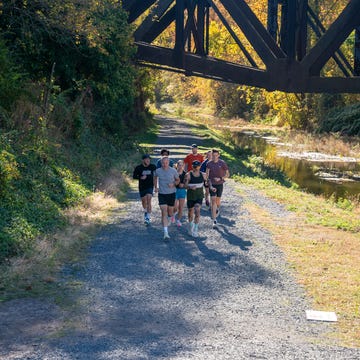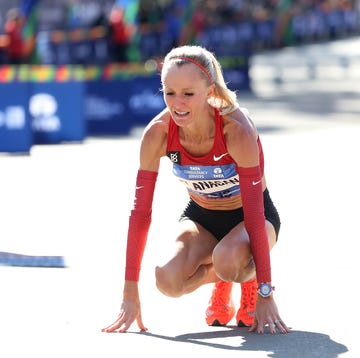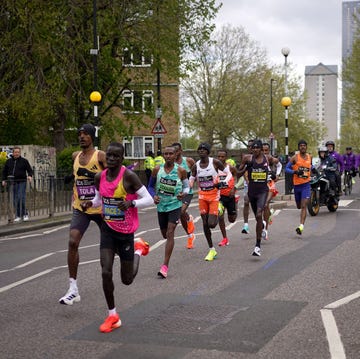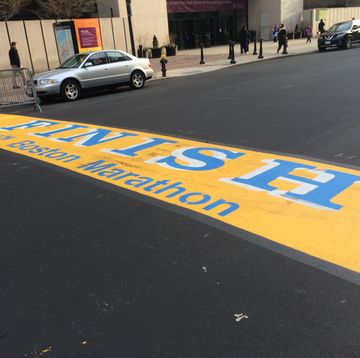The Oklahoma State University Cowboys have won three of the last four NCAA titles in men’s cross country. If they notch a fourth title this fall, as many fans and coaches predict, they’ll cement their place among perennial powerhouses like Colorado, Stanford and Wisconsin. But unlike these storied programs—many of which have taken more than a decade to amass their wins—the Cowboys’ ride at the top is only a recent phenomenon.
What’s behind their meteoric rise?
In this exclusive series, Running Times part I of the series inside Oklahoma State cross country.
See part II
Ask the Coaches: Foamy Sweat
Part III: It Takes Seven
Joseph Manilafasha is sitting in the hot Texas sun, barrel-chest heaving. There’s sweat rolling down his stubbled temple, his legs and arms shaking slightly, still coming down from the day’s race. It’s Nov. 2, 2013, 30 minutes after the Big 12 Championship race at Cottonwood Creek Golf Course, in Waco, Tex. Rubbing at the bridge of his nose, he peers at the ground and says, “It wasn’t a good day.”
He was the Cowboys’ 10th runner. It was the worst finish of his Big 12 career (40th) by 20 or so places. And he didn’t fare so well at pre-nationals two weeks before, either (66th). Asked if injury or sickness affected his performance, he shakes his head. He’s never been one for excuses.
Manilafasha knows he needs to come around, and quickly, if the Cowboys are going to defend their national title three weeks from today in Terre Haute. “I’ll be there at nationals,” he says and unties his shoes. There’s reason to believe him: Manilafasha failed to score at last year’s Big 12s, but rallied three weeks later for All-American honors as OSU’s fourth scorer at nationals. His coaches call him a “gamer,” the guy who always shows up at the big one. For now, though, he’s happy the Cowboys have won their sixth Big 12 title in a row, 33-77 over Iowa State. And anyway, one bad race is not the end of the world.
Manilafasha, 22, grew up the youngest of seven brothers and two sisters in Bubanza, Burundi. In 1993, when Manilafasha was 2, the outbreak of the Burundi civil war claimed his father, Severin Mirenzako. Amid the ongoing violence, which would take 300,000-plus more lives before a precarious peace deal in 2005, the family, a mixture of the warring Hutu and Tutsi ethnic groups, fled the country. Manilafasha’s mother, Generuse Ntirampeba, made the long, perilous journey south to Tanzania with her nine kids. They eventually settled in a refugee camp near Kigoma, along Lake Tanganyika, in 1996.
Manilafasha remembers the next five years as “just survival.” The family moved out of aid tents and constructed a small home “of mud and things.” They farmed, hunted and collected fruit in the jungle to supplement their meager food rations. At first, school was just English and mathematics meetings under a tree. “But society comes together,” he says, his words careful and breathy. “Markets and schools popped up.”
In 2001, Ntirampeba’s application for refugee status was finally approved and the family was placed in Denver, where Manilafasha attended Denver North High School. “I guess I ran because my brothers did,” he says. He was good enough for two state titles, three Foot Locker Finals and a scholarship to OSU. He’ll graduate with both a bachelor’s and master’s in political science (with a concentration in international conflict) in May.
While a trainer looks Manilafasha over, fellow senior Tom Farrell assures him the poor performance is no big deal. Farrell, outwardly the team leader, finished a disappointing third on the team today. His fifth-place effort was 13 and 14 seconds, respectively, behind Shadrack Kipchirchir in third and Kirubel Erassa in second. (Defending NCAA champ, Kennedy Kithuka, took the day.) “It’ll be 95 on the week,” he says, referring to his mileage load. “Looking forward to the taper and feeling good at ‘nats.’”
Farrell looks vaguely like Jimmy Stewart but speaks at a serious clip with a faint Scottish accent. He has the biting humor of a Brit, quick to chuckle and turn a joke on himself. Just now, bouncing around the makeshift team area congratulating the women on their third-place finish, the 22-year-old seems as excited about their showing as the men’s. Oklahoma State, unlike many universities, runs a combined men’s and women’s program. Farrell, for one, can’t imagine it any other way.
He grew up around track, in Carlisle, England, just south of Scotland. “Squashed in the van, packed in hotels, screaming at the fence—I don’t know anything else.” Farrell’s parents were track athletes well into his adolescence. Mum retired from high jumping when Farrell was 5, dad the steeple and cross five years later. “By the time dad was retiring, I was begging to be trained,” he remembers with a laugh. “I start breakfast with track results. All I think about is training. My girlfriend would say I lead a boring life.” Well, it gets him fit: Two weeks before Big 12s, during a 100-mile week, Farrell ran a 6-mile time trial in 28:30, starting at 5-minute pace and closing down with a 4:25 last mile that shook Erassa and Kipchirchir on OSU’s woodchip trails.
If Farrell is the congenital track geek, Kipchirchir, 23, is the untaught late bloomer. Although the Eldoret, Kenya, native is a member of the famed Kalenjin Tribe (winners of something like 40 percent of all international distance medals since 1980), he didn’t start running until the summer after high school. At that point, two of his brothers had already earned scholarships stateside for running. His father, a former local politician who now helps families secure visas, encouraged Kipchirchir to do the same. “I thought, ‘If running will take me to the U.S., to school and jobs, I will not ask for more than that,’” he explains. The Western Kentucky transfer will graduate with a degree in construction management in the spring.
Running side by side, Kipchirchir and Farrell took the Saturday morning race out in 2-flat for the first 800. It was an effort by Coach Dave Smith to prepare the athletes for the cardiovascular shock of the nationals stampede, although it was faster than the 2:08 he prescribed. (Kithuka hung back, a grin on his face.) Erassa, 20, who would end up beating both Kipchirchir and Farrell, was 20 meters behind the two seniors. Sporting Oakley sunglasses, a clean-shaved head and an etched chin-strap beard, the six-foot Addis Ababa-born Erassa looked the picture of cool, even at the hot pace.
From left to right: Taylor Monaghan (298), Shane Moskowitz, Brian Gohlke (295), Kirubel Erassa (293), Chad Noelle (300), Craig Nowak (301), Shadrack Kipchirchir (296), Joseph Manilafasha (297), Thomas Farrell (294)
Although Farrell and Kipchirchir are the older, more seasoned athletes, Erassa has enjoyed the standout year. With two runner-up honors already this fall, at the Jamboree and today in Waco (both to NCAA champ Kithuka), he has become the de facto OSU leader. He appears poised for his first All-American award on the grass. If asked, he’s quick to attribute the ongoing breakthrough to his summer back home in Ethiopia.
Though Erassa calls Ethiopia home, this summer was in fact the first time he’d touched native soil since 2005. That year, Erassa’s mother moved him and nine siblings to Grayson, Ga., to live with a brother and sister already there. He picked up running his freshman year, but dislocated his elbow on a tree during his first run. He kept at it and, after a steady progression, ran 14:19 indoors for 5K his senior year. “I went to OSU mainly because I promised Girma [fellow Ethiopia-Georgia transplant and former OSU All-American Girma Mecheso] I would go where he went.”
The same kind of loyalty finally lured him home this summer. Reuniting with his father, who works in real estate and business, Erassa visited his old schools and friends and hooked up with a local club track team, which housed at least one sub-13-minute 5K runner. “I didn’t realize how painful running could be,” he says with not a little shock. “We’re spoiled here. There: shoes with holes, no gear, limited opportunities. But they run so hard.” The business marketing and management major came back to Stillwater three months later “monster fit,” as assistant coach Bobby Lockhart observed, intent on making the most of his last two years.
Between Erassa, Farrell, Kipchirchir and Manilafasha—each with at least one All-American certificate—you’re looking at the best 1-2-3-4 punch in the NCAA, hands down. But cross country scores five and often comes down to the performance of six or seven, as any coach will remind his or her team in the huddle. If the Cowboys’ lopsided Big 12 victory made anything clear then, it was that OSU was vulnerable at the five-seven spots.
Shane Moskowitz, 22, is the team’s probable fifth scorer. The sub-4 miler is only four weeks into training, though, as he had surgery on a hip labral tear this summer. He did finish a respectable 12th in Waco, but it was hard to know how that translated to Terre Haute. Was he a top-100 guy, or top-50? Smith thought they’d need the latter to win. It was still unclear, though, if Moskowitz’s track credentials and 4-week-old fitness would hold up under the demand of two late-season 10Ks at regionals and nationals.
The Silverdale, Wash., native doesn’t seem the least bit fazed. He feels his fitness is coming around just in time. He has a muscular frame and 5 o’clock shadow, both of which belie his gentle voice and sheepish sense of humor. As he walks back to the van, he jokes with Coach Sean McCabe about his catching Moskowitz on a “secret” 15-miler out on Stillwater’s dirt roads. “You don’t think I know those roads?” McCabe jabs. “I figured if I ran far enough out … ” Moskowitz says and smirks at the ground knowingly.
Like many of his teammates, Moskowitz says he started running simply because he was good at it. But his honesty extends past theirs: “Nothing defined me; I wanted an identity, something to define me.” Now he lives alone, a self-professed track addict, but spends most of his free time with Manilafasha and Erassa. “Our daily life is restricted,” he says. “Poker, maybe shoot hoops, movies.” When asked what movies he likes, there’s a long pause: “Romance, mostly.” The finance major wants to coach after he’s done running.
That makes five; the other two question marks on the team are, incidentally, both Texans. And buddies. They’re actually sitting together in the finish chute congratulating each other and laughing while everyone else is sitting alone, zonked out in their own private pain. Brian Gohlke, 20, beat Craig Nowak, 19, by 5 seconds, but Nowak’s not sore. There is a friendly competitiveness between them, even if by beating both Moskowitz and Nowak today, Gohlke has potentially overtaken Nowak for a scoring spot at nationals.
Nevertheless, Nowak is the athlete with the bigger physical upside: the athlete on whom a coach might be willing to take a risk. Just looking at him confirms it. Like a young Matt Tegenkamp, he has a lean, muscular frame crawling with visible veins. His fist-shaped calf muscles are bunched up on his legs like a Kenyan’s. Last year, as a freshman, he won U.S. junior 8K champs and has made serious headway since then. But as today’s race showed, he has yet to really prove himself in a big NCAA contest.
Among those on the team, the Cypress, Texas, native is known for his almost pathological smile and positive attitude. He speaks with a very slight drawl and favors comforting Southernisms like, “I gave it a whirl” and “I got a knack for that.” Athletics run in Nowak’s family: Mom was a heptathlete at SDSU and dad, who now operates his own business moving off-shore oil rigs, ran at Kings Point. That athleticism, for the blond finance major, extends beyond running: He golfs with a 2 handicap.
Gohlke, who grew up in Houston, lives just down the hall from Nowak, in a house they share with two female runners. The Texans are best friends, go to church on Sundays, pose together for photos post-race. Although he’s an accounting major who’ll get his master’s along with his bachelor’s degree, Gohlke is probably the least clean-cut of the top seven runners. On a bet, he grew his hair long last year and has a cursive tattoo scrawled across his right ribs. Over the phone, he sounds like a mellow gear-head, chatting comfortably about wakeboarding and camping trips and building up fixed-gear bikes. He’s the only one on the team who uses “dude” in any frequency.
That opening 800 left Gohlke, and the rest of the group, in serious oxygen debt. Some recovered; most didn’t. Now, at the finish chute, they’re all toppled over in the spongy desert grass, talking in delirious amazement. Smith eyes their distress with sympathy. “That was so foreign to us,” he says later, “but we needed it hard for a reason.”
Under a cloudless blue sky, with the morning’s wind still whipping down out of the north, Smith gathers up the bodies of his seven guys for a talk. In the huddle, he acknowledges the disappointment experienced by Manilafasha, Farrell and others: “Look, you’re allowed to have a bad day. That happens.” But, in turning his attention to the national championship, he quickly qualifies the comment: “If we just maintain, though, we’re going to get beat. We need to get better over these next three weeks. Gotta stay mentally tough. Gotta fight.” It’s hard for Smith to stay serious for too long, and so he immediately brings the attention back around to winning a sixth consecutive Big 12 title, tells the guys to go cool down, relax, enjoy it.
All of a sudden, though, for the first time all season, people are nervous. Smith and Lockhart, and the 11 other OSU staff in attendance that morning, are chewing lips and squinting hard into the distance. Everyone is trying to figure out who will be the five scorers in Terre Haute, who might be injured, who might have a bad day. Most important, they’re thinking about how in the hell they can beat a fast-closing Colorado squad now ranked No. 1. (OSU had dropped to third after pre-nationals weekend, Oct. 19.) There are too many variables and too little time to control for them. “It’s a conundrum,” Smith admits.
Later, at the awards ceremony, in an open-air, wood-paneled pavilion overlooking the golf course, the PA reminds us that our Big 12 champs, standing here in white T-shirts commemorating the event, are also “the defending NCAA champions.” That defense will take place three weeks from now. And for the first time all season, doubt has found its way to Stillwater.
See Sangre Road, joins the Cowboys through the 2013 season as they try to defend their 2012 NCAA title.
Noah Gallagher Shannon, First Boston Marathon? Heres What to Know, for the results of the Cowboy Jamboree, OSU’s first race of the year.
***
Check back championship weekend, Nov. 23, for the next dispatch, this time from Terre Haute, Ind., the site of the NCAA championships. The Cowboys will attempt to win their fourth NCAA title in five years. They are set to battle No. 1 Colorado and No. 2 Northern Arizona in the race to decide the national champion.
Part II: The Calculus of Cross Country was a multitime Colorado state champion in cross country and track and ran at the University of Wisconsin. Gallagher Shannon’s work has appeared in Slate and Everything You Need to Know About Hip Pain, Part II: The Calculus of Cross Country.













